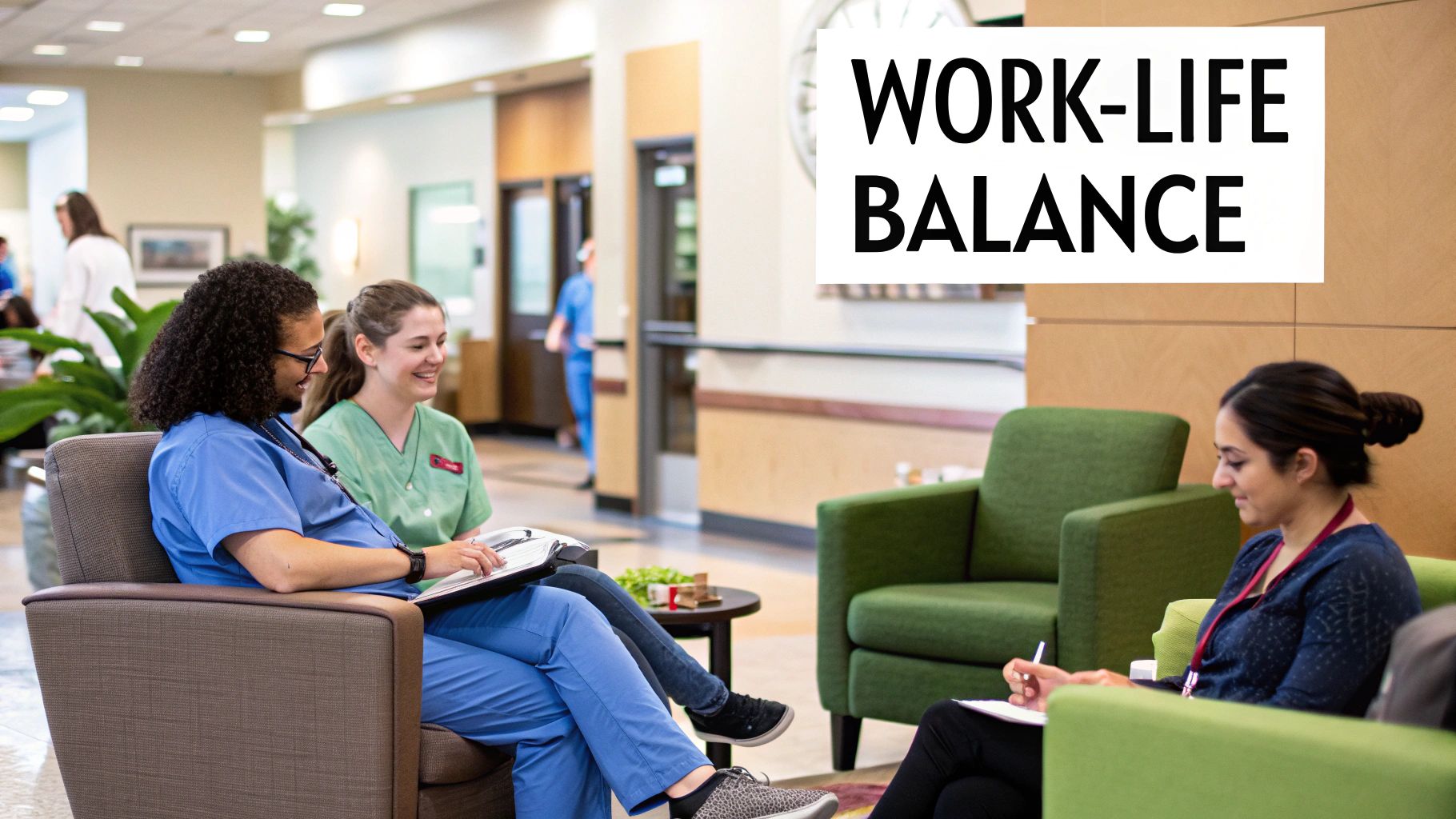The residency interview is a two-way street. While programs are evaluating you, you must simultaneously assess whether they are the right fit for your specific career goals, educational needs, and personal well-being. This critical evaluation goes far beyond what you can find on a website or in a brochure. Asking generic, surface-level questions will yield generic answers, leaving you unable to differentiate between seemingly similar programs when it comes time to create your rank list.
This guide provides a comprehensive, organized list of strategic questions to ask about residency programs. We've broken them down into eight essential categories, from curriculum structure and clinical volume to program culture and post-residency career support. Each question is designed to uncover the tangible, day-to-day realities of a program, giving you the specific insights needed to make an informed, confident decision. By using this framework, you can move past the sales pitch and gather the concrete data required to identify the training environment where you will truly thrive. Use these targeted inquiries to compare programs effectively and find the perfect match to launch your medical career.
1. What is the program's board pass rate and job placement statistics?
When evaluating residency programs, your primary goal is to find a place that will successfully train you for independent practice. This question cuts directly to the core of that objective. A program's board pass rate and job placement statistics are two of the most powerful, data-driven indicators of its educational quality and professional support system.

The board pass rate reflects how well residents are prepared for their specialty certification exams, a critical step for licensure and practice. A consistently high pass rate, especially on the first attempt, suggests a strong curriculum and effective teaching. Job placement data reveals how successfully graduates achieve their career goals, whether that's a competitive fellowship, a position in academic medicine, or a private practice role in a desired location.
Why This Question Matters
Asking about these metrics provides a clear, quantitative measure of a program's success. It moves beyond subjective feelings about a program's "reputation" and gives you hard evidence of its ability to produce competent, employed physicians. It is one of the most fundamental questions to ask about residency programs because it directly relates to your future career prospects.
How to Dig Deeper
Don't just accept a single number. Get a more complete picture with follow-up questions:
- Request a Trend: Ask for data from the last 3-5 years. A single good year can be an anomaly, but a consistently high pass rate demonstrates sustained excellence.
- Compare to National Averages: How does the program's rate compare to the national average for that specialty? This provides crucial context for their performance. For a deeper dive into how different specialties perform, you can learn more about residency match statistics and trends.
- Inquire About Graduate Paths: Ask for a breakdown of where graduates go. What percentage enter fellowships versus private practice? How many secure positions in academic medicine?
- Ask About Support Systems: What resources are available for residents who may be struggling with exam preparation? A strong program has a plan to support every trainee.
2. What is the program culture and work-life balance like?
Beyond the curriculum and clinical training, the environment you train in for the next several years will profoundly impact your well-being and professional growth. Program culture encompasses the interpersonal dynamics, support systems, and overall atmosphere, while work-life balance reflects the program's commitment to preventing resident burnout. This question helps you gauge the human element of a residency program.

A positive culture is one where residents feel supported, respected, and part of a cohesive team, not just a cog in a machine. Good work-life balance doesn't mean residency will be easy, but it does mean the program actively implements strategies to help you manage the intense demands of training. This could include protected wellness time, flexible scheduling for personal matters, and access to mental health resources.
Why This Question Matters
Residency is a marathon, not a sprint. A program with a toxic culture or one that completely disregards resident well-being can lead to burnout, depression, and a diminished educational experience. Asking about culture and work-life balance is crucial because it helps you find a sustainable environment where you can thrive, not just survive. It is one of the most important questions to ask about residency programs because your mental and emotional health are foundational to your success as a physician.
How to Dig Deeper
Go beyond the official statements from the program director to get a genuine feel for the day-to-day reality.
- Ask About Specific Initiatives: Inquire about dedicated wellness programs, social events, or resident-led committees. Do they have a wellness coordinator or a formal mentorship program?
- Observe Interactions: During your interview day or social events, pay close attention to how residents and faculty interact with each other. Do they seem collegial and friendly, or is the atmosphere tense?
- Inquire About Support for Life Events: Ask how the program handles major life events like a family emergency, illness, or parental leave. Their answer reveals their flexibility and level of support.
- Talk to Current Residents: If possible, speak with residents privately and ask them directly about burnout, camaraderie, and how responsive the leadership is to their concerns. Ask them what they do for fun outside of the hospital.
3. What clinical experiences and case volume will I encounter?
The core of your residency training is hands-on clinical experience. This question is designed to uncover the breadth and depth of a program's patient care opportunities, which directly shapes your competence and confidence as a physician. The volume and variety of cases you manage, from common "bread and butter" presentations to complex, rare diseases, will define the foundation of your medical expertise.

A program at an urban trauma center will offer a different experience than one at a community hospital focused on primary care. Similarly, an academic center with a large referral base for rare diseases provides different training than a county hospital serving diverse, underserved populations. Understanding these nuances is critical to aligning a program's strengths with your personal career goals and learning needs.
Why This Question Matters
This is one of the most vital questions to ask about residency programs because your logbook at graduation is a direct reflection of your readiness for independent practice. A program with a high volume of diverse cases ensures you won't have significant gaps in your training. It determines whether you will be comfortable managing high-acuity patients, performing essential procedures, and handling the full spectrum of pathology within your chosen specialty upon completing your training.
How to Dig Deeper
Go beyond general statements and seek specific, quantifiable data to evaluate the clinical training environment:
- Request Case/Procedure Logs: Ask for anonymized case and procedure logs from recent graduates. How do their numbers for key index cases or required procedures compare to ACGME minimums and national averages?
- Understand Patient Demographics: Inquire about the patient population. What is the payor mix? What are the most common diagnoses? This gives you insight into the social and medical complexity you will encounter.
- Ask About Autonomy: How does resident autonomy progress from PGY-1 to the final year? Ask for specific examples of procedures or patient management decisions that senior residents are expected to make independently.
- Clarify Site Variety: What is the balance between inpatient, outpatient, and community rotations? Exposure to different practice settings is crucial for developing a well-rounded skillset.
4. What research opportunities and academic support are available?
For applicants aspiring to fellowships, academic medicine, or simply those with a passion for inquiry, a program's commitment to scholarly activity is a crucial factor. This question explores the infrastructure a program provides for resident research, including access to faculty mentors, funding for projects, and protected time to pursue academic interests. It reveals whether research is an integrated part of the curriculum or an afterthought.

A program with robust research support demonstrates a commitment to advancing its field and fostering the next generation of physician-scientists. This support can range from dedicated research rotations and statistical assistance to funding for conference travel and publication fees. Strong programs often have a clear, structured pathway for residents to engage in meaningful scholarly work, from case reports to complex clinical trials.
Why This Question Matters
Asking about research opportunities helps you gauge a program's academic rigor and its ability to support your specific career goals. Even if you don't plan on a career in academic medicine, participating in research hones critical thinking and analytical skills. This is one of the essential questions to ask about residency programs because it uncovers the institutional value placed on scholarly pursuits and mentorship beyond clinical duties.
How to Dig Deeper
Go beyond a simple "yes, we have research" and probe for specific details about the academic environment:
- Ask About Protected Time: How much dedicated time is allocated for research? Is it a block rotation, a longitudinal experience, or something residents must fit into their spare time?
- Inquire About Mentorship: What is the process for finding a faculty mentor? Are there established mentors with a track record of publishing with residents?
- Request Specific Examples: Ask to see a list of recent resident publications or presentations. This provides tangible proof of scholarly output and the types of projects residents are involved in.
- Clarify Funding and Resources: Is there funding for residents to present at national conferences? Does the program provide access to statisticians, librarians, or grant-writing support? To better understand how to leverage these opportunities, explore tips on building a competitive residency application through research.
5. How does the program handle resident evaluation and feedback?
A residency program's approach to evaluation and feedback is a direct reflection of its investment in your growth as a physician. This question probes into the systems a program has in place to assess your performance, identify areas for improvement, and guide your professional development. It's about more than just getting a grade; it's about receiving constructive, timely, and actionable guidance to become a competent and confident practitioner.
Effective evaluation systems are structured, frequent, and transparent. They often use milestone-based assessments tied to the ACGME core competencies, ensuring you are meeting specialty-specific standards. High-quality feedback is not just about pointing out mistakes; it's a two-way conversation that helps you build on strengths and develop strategies to overcome challenges.
Why This Question Matters
This is one of the most critical questions to ask about residency programs because your growth is entirely dependent on the quality of the feedback you receive. A program with a weak or inconsistent evaluation process leaves residents in the dark about their performance, potentially allowing knowledge gaps or bad habits to solidify. In contrast, a program with a robust feedback culture creates a supportive environment where you always know where you stand and have a clear path for improvement.
How to Dig Deeper
Go beyond a simple "we give feedback" and investigate the actual process. A detailed understanding will reveal how seriously the program takes resident education.
- Ask About Frequency and Format: How often are formal evaluations completed? Are they monthly, quarterly, or just at the end of a rotation? Ask if you can see an example of an evaluation form or portfolio template they use.
- Inquire About the Source of Feedback: Who provides the feedback? Is it just the attending physician, or does it include input from senior residents, peers, nurses, and other staff (360-degree feedback)?
- Clarify the Remediation Process: What happens if a resident is struggling or not meeting milestones? A strong program has a clear, supportive, and non-punitive process to help residents get back on track.
- Discuss Resident Self-Evaluation: Does the program incorporate resident self-assessment into the process? This demonstrates a commitment to fostering self-reflection, a key skill for lifelong learning in medicine.
6. What is the teaching quality and educational curriculum structure?
While clinical volume is essential, the educational framework that contextualizes this experience is what transforms a busy resident into a skilled physician. This question probes the core of a program's pedagogical philosophy, examining everything from didactic sessions and simulation labs to bedside teaching and curriculum innovation. A program with a robust and intentionally designed curriculum ensures you build a strong foundation of knowledge, not just a collection of patient encounters.
The quality of teaching directly impacts your ability to synthesize information, develop clinical reasoning, and prepare for board examinations. A well-structured curriculum provides a clear roadmap for your learning, ensuring you are exposed to the full breadth and depth of your specialty in a logical, progressive manner. It's the difference between simply seeing cases and truly understanding them.
Why This Question Matters
Asking about curriculum and teaching quality is a crucial way to assess how a program invests in its residents' intellectual growth. It reveals whether education is a central pillar of the program or an afterthought to clinical service. This is one of the most important questions to ask about residency programs because it determines the very nature of your day-to-day learning environment and your ultimate competence as a practitioner.
How to Dig Deeper
Go beyond asking if they "have didactics." Investigate the specifics to understand their educational commitment:
- Request a Curriculum Map: Ask to see a block schedule or a year-long curriculum overview. Is protected time for learning consistently honored?
- Inquire About Teaching Methods: Do they use innovative approaches like flipped classrooms, problem-based learning, or virtual reality simulations? How much of the learning is passive (lecture-based) versus active?
- Evaluate Faculty Commitment: Ask if faculty receive formal training or recognition for their teaching roles. The presence of a clinician-educator track or teaching awards signifies a culture that values medical education.
- Ask About Board Prep: How is board review integrated into the curriculum? Is it a last-minute cram session, or is it a longitudinal process woven into didactics from day one?
7. What are the program's financial aspects and benefits package?
While your primary focus is on clinical training, the financial reality of being a resident cannot be ignored. Your salary and benefits package directly impact your quality of life, ability to manage debt, and overall well-being. This question is not about chasing the highest paycheck; it is about ensuring financial stability so you can fully dedicate yourself to the demanding work of residency.
A comprehensive benefits package can be just as valuable as the salary itself. Understanding the full scope of what a program offers-from health insurance and meal allowances to professional development funds-is crucial for making an informed decision. This is one of the most practical questions to ask about residency programs, as it addresses the day-to-day realities of your life outside the hospital.
Why This Question Matters
Financial stress is a significant contributor to resident burnout. A program that provides a fair salary and a robust benefits package demonstrates that it values its trainees and invests in their well-being. This allows you to focus on your education and patient care without the constant worry of making ends meet, especially in high-cost-of-living areas.
How to Dig Deeper
Look beyond the annual salary figure to understand the total compensation. Use these follow-up questions to get a clearer picture:
- Analyze the Full Package: Ask for a detailed breakdown of benefits. Does it include health, dental, and vision insurance? Is there a retirement plan with a a match? Are there meal stipends, free parking, or housing assistance?
- Factor in Cost of Living: A high salary in an expensive city may not go as far as a moderate salary in an affordable one. Compare the program's compensation to the local cost of living.
- Inquire About Professional Funds: Is there an educational stipend? Ask what it covers, such as textbooks, question banks, conference travel, or board exam fees. Generous professional development funds are a major plus.
- Understand Moonlighting Policies: If you anticipate needing extra income, ask about the program's policy on moonlighting. Are there opportunities available, and what are the requirements to be eligible?
8. What post-residency support and alumni network exist?
A residency program's commitment to its trainees should not end on graduation day. The best programs cultivate a lifelong relationship with their alumni, offering continued support and fostering a powerful professional network. Asking about post-residency support is one of the key questions to ask about residency programs because it reveals a program's long-term investment in your career success.
This support can manifest in various ways, from formal job placement assistance and career counseling to informal mentorship from faculty and fellow graduates. A strong, engaged alumni network is an invaluable asset, providing a built-in community of colleagues who can offer advice, referrals, and collaboration opportunities throughout your career. It demonstrates a program culture that values its people well beyond their training years.
Why This Question Matters
Training is just the first step; building a sustainable and fulfilling career is the ultimate goal. A program with a robust support system and alumni network provides a significant advantage. This network becomes a professional safety net and a springboard for future opportunities, whether you're looking for your first job, navigating a career transition, or seeking expert opinions years down the line. It signifies that the program views you as a colleague for life, not just a trainee for a few years.
How to Dig Deeper
Go beyond a simple "yes, we have one" and probe for specifics to understand the true value of the network:
- Inquire About Specific Resources: Ask about tangible benefits. Do they have an alumni job board, a formal mentorship program pairing recent grads with senior alumni, or a listserv for sharing opportunities?
- Ask About Engagement: How active is the network? Are there regular events like annual conferences, regional meetups, or virtual networking sessions? High engagement indicates a truly connected community.
- Speak with Recent Graduates: Ask the program coordinator if you can connect with a few recent alumni. This is the best way to get a candid perspective on the post-residency support they have received.
- Understand Career Trajectories: Inquire about where alumni are now. Are they in leadership positions, academic roles, or diverse private practices? This gives you an idea of the network's breadth and influence. Strong interview skills are crucial for these conversations; you can find more guidance in our resources for medical residency interview preparation.
Key Questions Comparison for Residency Programs
| Aspect | Board Pass Rate & Job Placement | Program Culture & Work-Life Balance | Clinical Experience & Case Volume | Research Opportunities & Academic Support | Resident Evaluation & Feedback | Teaching Quality & Educational Curriculum | Financial Aspects & Benefits Package | Post-Residency Support & Alumni Network |
|---|---|---|---|---|---|---|---|---|
| Implementation Complexity | 🔄 Moderate – Data collection and tracking required | 🔄 Moderate – Subjective assessments, ongoing culture | 🔄 Moderate – Coordination of case logs and rotations | 🔄 High – Protected time and mentorship needed | 🔄 Moderate – Multi-source feedback systems | 🔄 Moderate – Curriculum planning and faculty training | 🔄 Low – Payroll and benefits management | 🔄 Low – Networking systems and alumni relations |
| Resource Requirements | 📊 Data analytics, tracking systems, alumni follow-up | 💡 Resident and faculty engagement, wellness programs | 📊 Access to diverse clinical sites and case volume | ⚡ Dedicated research time, funding, mentors | 💡 Faculty time for assessments and feedback | ⚡ Skilled educators, simulation facilities | 📊 Financial resources for salary, benefits | 💡 Alumni network platforms, staff for career support |
| Expected Outcomes | ⭐ High – Objective measure of program success | ⭐ High – Direct impact on resident satisfaction | ⭐ High – Competency and confidence gain | ⭐ High – Improved academic competitiveness | ⭐ High – Timely performance improvements | ⭐ High – Enhanced knowledge retention | ⚡ Moderate – Financial stability | ⭐ High – Career advancement and lifelong support |
| Ideal Use Cases | Residents prioritizing certification and job prospects | Residents valuing personal well-being and support | Residents seeking broad and intensive clinical exposure | Residents targeting academic or research-focused careers | Residents needing clear performance feedback | Residents wanting structured, diverse learning approaches | Residents concerned about financial wellness | Residents seeking long-term career networking |
| Key Advantages | ⭐ Objective success indicators, career planning | ⭐ Improved daily life quality, reduced burnout | ⭐ Comprehensive hands-on training | ⭐ Research skill development and academic growth | ⭐ Structured assessment, early identification of issues | ⭐ Diverse teaching methods, better exam preparation | ⭐ Reduces financial stress, supports development | ⭐ Strong career and mentorship support |
Making Your Rank List with Confidence
The residency interview and selection process is far more than a simple Q&A session; it's a mutual evaluation. While programs assess your potential, you are simultaneously determining where you can best evolve into the physician you aspire to be. The comprehensive list of questions to ask about residency programs provided in this guide is your toolkit for moving beyond surface-level impressions and website brochures. By digging into the specifics of curriculum, culture, support systems, and career outcomes, you transform from a passive applicant into an active investigator of your own future.
Remember, the goal is not just to match, but to match well. A program’s prestige means little if its culture stifles your growth or if its educational philosophy misaligns with your learning style. The answers you gather will paint a detailed picture, helping you weigh the tangibles, like board pass rates and benefits, against the intangibles, like resident camaraderie and faculty approachability. This process is about finding an environment where you will be challenged, supported, and ultimately, fulfilled.
From Information to Action: Building Your Rank List
As you collect information from interviews, resident socials, and program materials, the next crucial step is to organize it effectively. Don't rely on memory alone. Create a spreadsheet or a dedicated notebook to track each program's responses to your key questions. This systematic approach allows you to make direct, evidence-based comparisons.
Consider using a weighted system for your rank list. Which factors are your non-negotiables?
- For the aspiring academic: A program’s research output and protected academic time might be your top priority.
- For the future private practitioner: High clinical volume and training in practice management could be paramount.
- For those prioritizing well-being: A robust wellness program, flexible scheduling, and a supportive culture may outweigh other factors.
By assigning importance to each category, you ensure your final rank order list is a true reflection of your personal and professional priorities, not just a hierarchy of program reputations. This deliberate, thoughtful strategy is your best defense against post-match regret and the key to securing a position where you can truly thrive. You have done the hard work to get to this point; asking the right questions is the final, critical step to ensure that effort pays off in the best possible way.
Navigating the complexities of the residency match requires more than just a strong academic record; it demands strategic preparation. If you want to refine your interview skills and ensure you ask the right questions to find your perfect fit, the experts at Ace Med Boards are here to help. Explore our residency match planning and interview preparation services at Ace Med Boards to gain the confidence you need to succeed.
